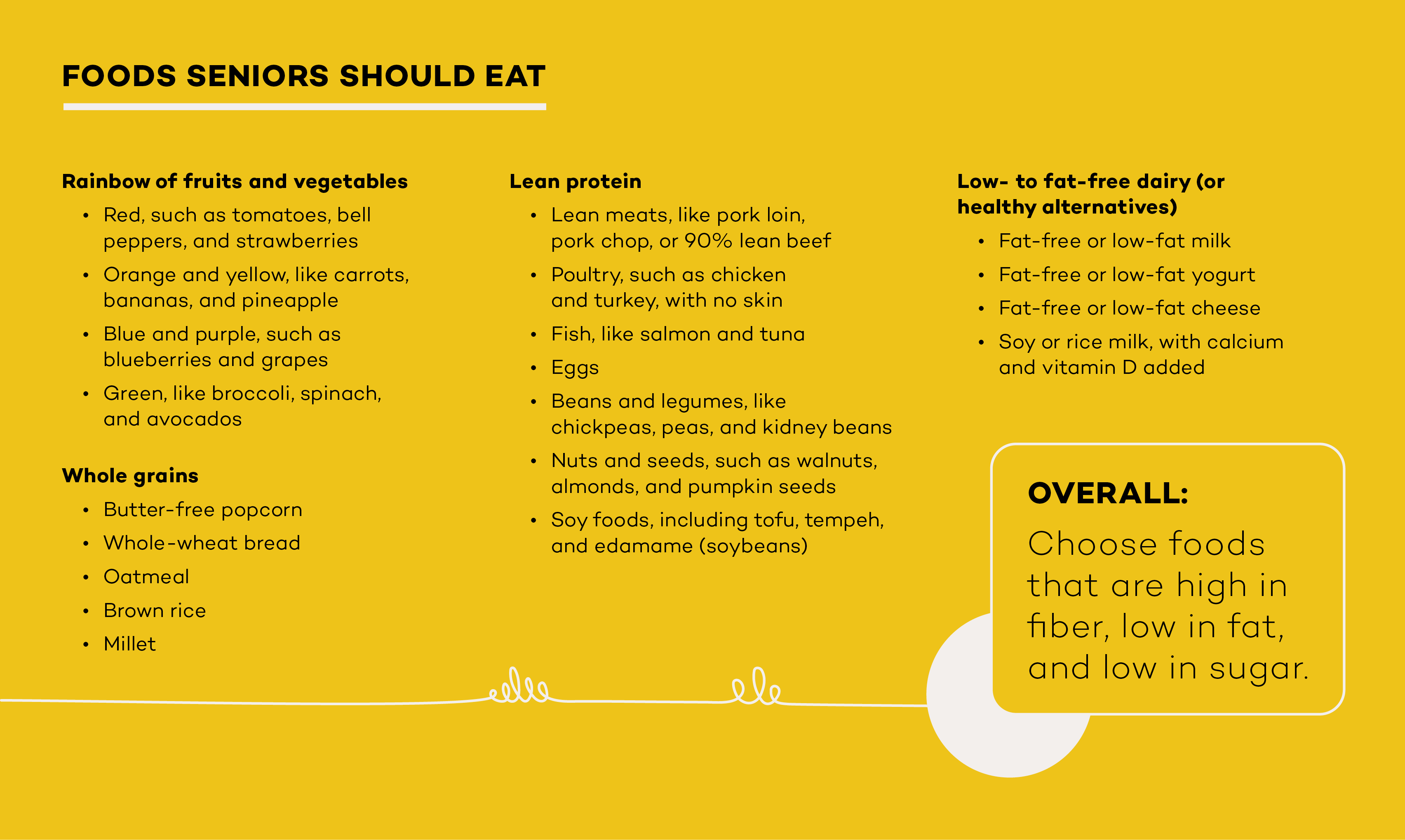
As your body changes over the years, your dietary needs do, too. You must focus on foods that support your immune system and help you maintain muscle mass and a healthy weight. You must also avoid or limit those that take away from these goals. This begs the question: What foods should seniors eat more and less of to be well in this stage of life?
The answer can steer you toward the nutrient-dense groceries to buy and away from the foods to avoid placing in your shopping cart. That’s why we’ve included a complete list of what foods to eat and what foods to avoid in a FREE shopping list you can download and take to the store.
Eating healthy meals is among the top health tips to safeguard your well-being as an older adult. While you may read about various diets for people over 60, you can get the nutrition you need when you incorporate these foods seniors should eat every day:
“Eat the rainbow” of produce to enjoy many health benefits. Choose fruits and vegetables in assorted colors that include:
You can opt for frozen fruits and vegetables and get the best foods at budget-friendly prices, while extending their shelf life.

Studies show that including whole grains in your diet reduces your risks for diabetes, liver disease, gum disease, colorectal cancer, and weight gain, while also improving your cognitive health.
Simple changes to your diet, like moving from white to whole-wheat bread or snacking on butter-free popcorn instead of chips, can make a difference. But incorporate these whole grains into your meals for the most benefit:
Protein becomes more important in later stages of life because it’s essential to help counteract the loss of muscle that occurs with age. But choose lean proteins to lower your intake of saturated fat, which can be harmful to your heart, liver, and overall health. Fortunately, you have plenty of options, including:
Dairy offers two essential nutrients that you need more of with age: calcium and vitamin D.
It may be no surprise that calcium is necessary for bone strength, but you may not know that your nervous system, blood vessels, and hormones also need it to function. Vitamin D becomes vital, not only for overall health, but to also help your body absorb calcium. That’s why it’s helpful to look for dairy items that offer both, while also being mindful of saturated fat. Your healthiest options include milk, yogurt, or cheese that is fat-free or low-fat.
If you have issues with dairy or its lactose, you may opt for a milk alternative, such as soy or rice milk, that has added calcium and vitamin D.
It’s important to note that, while milk helps you be hydrated, it shouldn’t be your main source of hydration due to its sugar content. Instead, aim to drink six to eight glasses of water per day to avoid dehydration and illness.

It’s important for older adults to limit foods that are high in sodium, saturated fat, and added sugar. These additives can raise your risk of developing heart disease, diabetes, and a host of other issues. But here are specific foods seniors should not eat:
High levels of sodium and nitrates or nitrites found in many deli meats, like ham and turkey, are associated with a higher risk of cancer. When you eat two servings of processed red meat per week, such as bacon and sausage, you increase your risk for dementia by 14%.
Fish and shellfish, including oysters, clams, and scallops, could contain harmful bacteria that may cause diarrhea, vomiting, and other symptoms when eaten uncooked. As you get older, your immune system weakens, making foodborne illnesses riskier and potentially life-threatening.
Unpasteurized milk, or raw milk, can also host dangerous bacteria, such as E. coli, salmonella, or listeria, since it has not undergone the heating process to kill it. This makes drinking or cooking with raw milk potentially unsafe, especially for older adults. When buying milk, look for pasteurized products.
The high moisture content of soft cheese makes it a hospitable environment for listeria and other bacteria. This means you may wish to avoid brie, camembert, blue cheese, and some queso cheeses. You can lower your risk for food poisoning when you choose a pasteurized soft cheese, such as cream cheese, feta, or cottage cheese, or a hard cheese.
While nutritious, sprouts are also prone to bacteria, generally E. coli and salmonella, due to the moist environment in which they grow. The potential risks include food poisoning or even kidney failure in severe cases. The best way to avoid the danger is to cook the sprouts, but in doing so, you may lose some of the nutritional value.
Uncooked or raw eggs are another food that can lead to digestive problems and even other hazards if the infection spreads within your body. This is due to the presence of salmonella within the egg or its shell. A good practice, in addition to cooking your eggs, is to buy refrigerated eggs and keep them cold.
The lining of some canned foods and drinks, as well as some plastic bags or containers, may contain a chemical compound called Bisphenol A (BPA). BPA has been linked to type 2 diabetes, high blood pressure, and heart disease. When buying canned food, bottled water, or other groceries stored in plastic, look for a ‘BPA-free’ label.
The nutrition label on your cooking spray may be deceiving. It may read that there are no fat and calories per serving, but the serving size may be unrealistic — one that you will far exceed. Instead, choose cooking oils, which may be lower fat and heart healthy when used in moderation, such as canola or olive oil.
While meat may naturally contain trans-fat, it’s important to avoid processed items with manufactured trans-fat. These can increase your bad cholesterol and your risk for diabetes, heart attack, and stroke. Check product labels for trans-fat as well as for “hydrogenated vegetable oil.” You may find them in frozen pizzas, refrigerated dough, coffee creamer, and many other items.
Whether regular or diet, the daily consumption of soda is simply not a good idea. Just one soda a day can increase your odds for diabetes and heart disease or ultimately result in gum disease. Further, with the risk of osteoporosis increasing with age, it’s important to avoid or minimize sodas since they can lower bone density in women.
As you get older, you may not be able to tolerate alcohol as well as when you were younger. This can make you more susceptible to falls and injuries. Heavy or regular alcohol intake can also increase your risk for heart disease, liver disease, and diabetes. You may also experience issues with your memory and mental health. The goal is to abstain from alcohol completely — or have one drink per day for women or two for men — to help maintain your well-being.
As you make healthier choices, reading nutrition labels should get easier and serve as a quick guide for making decisions. Remember that foods high in fiber, vitamin D, and calcium — and low in saturated fat, added sugar, and sodium — make the best foods for seniors.
Remember to download our FREE shopping list to take to the grocery store.
Photo: iStock
Wellabe offers life and supplemental health insurance plans to help you prepare for good days and bad. We’ll always be here to empower you to be well — well prepared, well protected, and well loved.